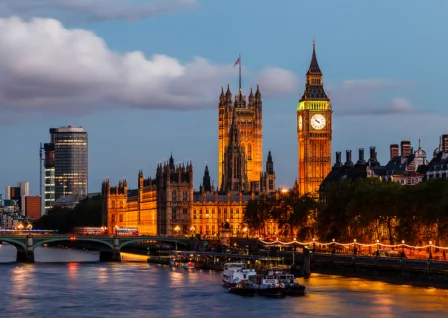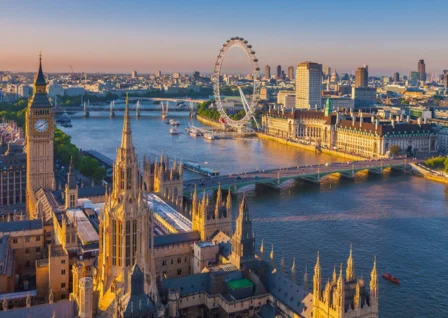


The United Kingdom (UK) is one of the most popular Study Abroad destinations for international students. Every year, thousands of students from all over the world including India choose the UK for higher education. The UK is home to some of the world’s oldest and most respected universities such as the University of Oxford, the University of Cambridge and Imperial College London. One of the main reasons students choose the UK is the high quality of education. UK universities are known for their high quality of education, research output and experienced faculty. They offer a wide range of courses at undergraduate, postgraduate, and doctoral levels in subjects like engineering, business, law, medicine, humanities, and more. The teaching style in the UK encourages students to think independently and participate in discussions and gain practical experience.
Another major advantage of studying in the UK is the shorter course duration. While undergraduate courses in many countries take four years in the UK, most bachelor's degrees are completed in three years. Similarly, master’s degrees can usually be finished in just one year. This helps students save both time and money. The UK is also a culturally diverse and welcoming country. International students get the chance to meet people from different cultures and backgrounds. Cities like London, Manchester, Birmingham and Edinburgh are known for their vibrant student life, world class facilities and rich history. Studying in the UK can also improve your English language skills. As English is the main language used in classes and daily life, students become more confident in speaking, writing, and understanding English which is a big plus for future job opportunities.
| Category | Details |
|---|---|
| Top Colleges | University of Oxford, University of Cambridge, Imperial College London, UCL, University of Edinburgh |
| Popular Courses | Business, Engineering, Computer Science, Medicine, Law, Data Science, Finance, Arts |
| Average Tuition Fees | £10,000 – £38,000 per year (₹10 – ₹40 lakhs depending on course and university) |
| Intakes | January and September (main), some courses in May |
| Language Requirements | IELTS 6.0–7.5, TOEFL iBT 80–100, PTE 60+ or equivalent |
| Part-time Work | Up to 20 hours/week during term, full-time during holidays |
| Post-study Work Visa | Graduate Route visa: stay up to 2 years (3 years for PhD) after graduation |
| Eligibility Criteria | 60%+ in previous studies, English test score, SOP, LORs, financial proof |
| Visa Type | UK Student Visa (Tier 4) |
| Job Opportunities | Finance, IT, Engineering, Healthcare, Law, Media, Research |
| Starting Salary | £18,000 – £30,000/year (₹18–₹30 lakhs) which varies by field and experience |

To study in the UK, Indian students must meet certain academic, language and visa related requirements. Meeting the study in UK requirements is essential for admission and for other things. The eligibility criteria may vary slightly depending on the level of study (undergraduate, postgraduate, or doctoral), university, and course. However, the general requirements are the same for most UK institutions.
| Level of Study | Academic Qualification | English Language Requirement |
|---|---|---|
| Undergraduate (UG) | 10+2 from a recognized board with 60%–80% (varies by course) | IELTS 6.0–6.5 / TOEFL iBT 80–90 / PTE 60+ |
| Postgraduate (PG) | Bachelor’s degree with 60% or above | IELTS 6.5–7.0 / TOEFL iBT 90+ / PTE 65+ |
| PhD / Doctoral | Master’s degree in relevant field | IELTS 7.0+ / TOEFL iBT 100+ / PTE 70+ |
The UK has a student friendly admission process for international students. It is important to start early because preparing documents, taking language tests and applying for a student visa can take time. The admission process for UK universities may vary slightly depending on the course and university, but the steps below apply to most programs.
To study in the UK, if you're wondering what visa is required to study in UK, international students must apply for the Student Route visa (formerly Tier 4 visa). Below is the full process in detail:
Many international students search for the best courses to study in the UK, such as business, engineering, data science, and healthcare due to high demand and excellent career prospects. Many more courses are given below in the table format.
| Course Level | Popular Courses |
|---|---|
| Undergraduate (UG) | Business Management, Computer Science, Engineering (Civil, Mechanical, Electrical), Law (LLB), Medicine (MBBS), Psychology, Accounting and Finance, Economics, International Relations, Architecture |
| Postgraduate (PG) | MBA (Master of Business Administration), Data Science and Analytics, Cybersecurity, Artificial Intelligence, Public Health, Pharmaceutical Sciences, Education and Teaching, Fashion and Design, Environmental Science, Finance and Investment |
| High-Demand Courses | Nursing, Renewable Energy, Digital Marketing, Supply Chain Management, Media and Communication, Human Resource Management, Project Management |
| Course Level | Average Tuition Fees per Year | Fees in INR (Approx.) |
|---|---|---|
| Undergraduate (UG) | £10,000 – £25,000 | ₹10 – ₹25 lakhs |
| Postgraduate (PG) Taught | £11,000 – £30,000 | ₹11 – ₹30 lakhs |
| MBA | £15,000 – £40,000 | ₹15 – ₹40 lakhs |
| Medicine/Dentistry | £30,000 – £50,000 | ₹30 – ₹50 lakhs |
| PhD/Research Programs | £14,000 – £25,000 | ₹14 – ₹25 lakhs |
| English Language Courses | £4,000 – £12,000 (depending on length) | ₹4 – ₹12 lakhs |
| Expense Category | Average Monthly Cost (GBP) | Average Monthly Cost (INR) (approx) |
|---|---|---|
| Accommodation (Rent) | £500 – £800 | ₹53,000 – ₹85,000 |
| Food & Groceries | £150 – £250 | ₹16,000 – ₹26,500 |
| Utilities (Gas, Electricity, Water, Internet) | £50 – £100 | ₹5,300 – ₹10,600 |
| Transportation | £40 – £70 | ₹4,200 – ₹7,400 |
| Mobile & Internet | £10 – £30 | ₹1,000 – ₹3,200 |
| Books & Stationery | £30 – £50 | ₹3,200 – ₹5,300 |
Studying in the UK can be expensive, but many scholarships are available for Indian students to support their education. These scholarships are offered by the UK government, universities, and private organizations. Many Indian students apply for a scholarship to study in UK to reduce the cost of tuition and living expenses while pursuing their studies.
Chevening Scholarships are one of the most prestigious awards for Indian graduates with at least two years of work experience. The GREAT Scholarships offer £10,000 towards tuition fees and are available at select UK universities. Another well-known scholarship is the Rhodes Scholarship which funds exceptional students for postgraduate study at the University of Oxford.
Students in fields like arts, heritage, or humanities can apply for the Charles Wallace India Trust Scholarships, while the Inlaks Shivdasani Foundation supports those in creative or academic programs with up to $100,000 in funding. For Cambridge aspirants, the Dr. Manmohan Singh Scholarship is an excellent opportunity, particularly for STEM students. These scholarships make studying in the UK more accessible and help Indian students achieve their global education goals.
| University Name | Famous For | Location |
|---|---|---|
| University of Oxford | Humanities, Law, Medicine | Oxford, England |
| University of Cambridge | Science, Engineering, Economics | Cambridge, England |
| Imperial College London | Engineering, Technology, Medicine | London, England |
| University College London (UCL) | Architecture, Psychology, Arts | London, England |
| University of Edinburgh | Computer Science, Literature, Medicine | Edinburgh, Scotland |
| King’s College London | Law, Health Sciences, International Relations | London, England |
| University of Manchester | Business, Engineering, Social Sciences | Manchester, England |
| London School of Economics (LSE) | Economics, Politics, Management | London, England |
| University of Warwick | Business, Mathematics, Engineering | Coventry, England |
| University of Glasgow | Biomedical Science, Law, Humanities | Glasgow, Scotland |
Studying in the UK is a popular choice for Indian students due to world class universities, globally recognized degrees and a rich academic environment. The UK offers diverse courses in fields like engineering, business, medicine, and arts. Indian students can apply for various scholarships to study in UK, such as Chevening, Commonwealth, and university-specific awards. The post study work visa (Graduate Route) allows students to stay and work for up to 2 years after graduation. With a strong Indian student community, excellent teaching standards, and cultural diversity, the UK provides a great opportunity for personal and professional growth.
Studying in the UK offers excellent career opportunities for Indian students across various fields. UK degrees are globally recognized making it easier to find jobs both in the UK and internationally. Popular industries for graduates include technology, finance, healthcare, data science, law, and business management.
In addition, UK universities often have strong industry links, offering internships, placements, and career support services. This helps students gain real-world experience and improve their employability. Graduates with UK degrees also have better job prospects in India as employers value UK education for its practical and research-based learning approach.
| Study in Australia | Study in Canada |
| Study in USA | Study in New Zealand |
| Study in Ireland | Study in Germany |
| Study in Italy |
Yes, most UK universities require IELTS or another English proficiency test.
Yes, students can work up to 20 hours per week during term time and full-time during vacations.
Yes, many options like Chevening, Commonwealth, and GREAT Scholarships are available for Indian students.
Yes, the Graduate Route visa allows international students to stay and work for 2 years after completing their degree.
The main intakes are September (Fall) and January (Spring) with a few courses also available in May.